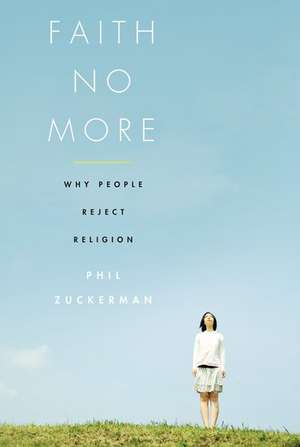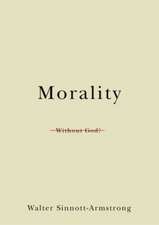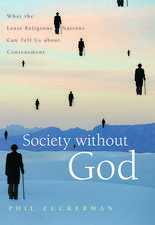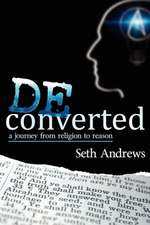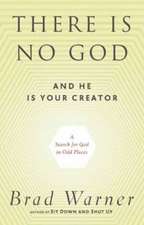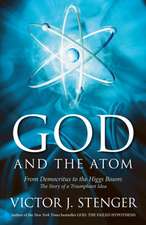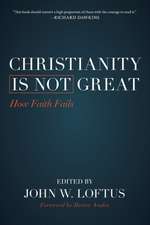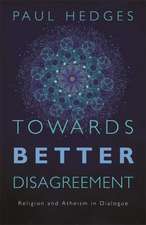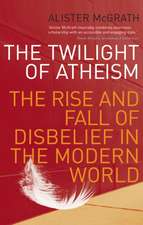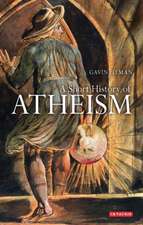Faith No More: Why People Reject Religion
Autor Phil Zuckermanen Limba Engleză Paperback – 25 iun 2015
Preț: 213.90 lei
Nou
Puncte Express: 321
Preț estimativ în valută:
40.94€ • 42.58$ • 33.79£
40.94€ • 42.58$ • 33.79£
Carte tipărită la comandă
Livrare economică 02-08 aprilie
Preluare comenzi: 021 569.72.76
Specificații
ISBN-13: 9780190248840
ISBN-10: 019024884X
Pagini: 240
Ilustrații: black & white illustrations
Dimensiuni: 155 x 231 x 13 mm
Greutate: 0.32 kg
Editura: Oxford University Press
Colecția OUP USA
Locul publicării:New York, United States
ISBN-10: 019024884X
Pagini: 240
Ilustrații: black & white illustrations
Dimensiuni: 155 x 231 x 13 mm
Greutate: 0.32 kg
Editura: Oxford University Press
Colecția OUP USA
Locul publicării:New York, United States
Recenzii
Everyone knows, deep down, that there is a conflict between reason and faith-between having good reasons for what one believes and having bad ones. This conflict finds its most poignant expression in the lives of men and women who have lost their belief in God despite their best efforts to maintain it. Faith No More offers a fascinating look at these lives, and at the myriad ways in which thoughtful people can come to their senses."
With Faith No More Philip Zuckerman has given us a fascinating look at how individual contemporary Americans raised in various religions awakened out of a belief in the supernatural. His care in not rounding all these up into any facile overarching theories is itself almost supernatural, and yet in this careful reporting of their stories he manages to offer a great deal of insight. It is a wonderfully informative and provocative study and should be read by everyone interested in the real experience of religion and irreligion."
Faith No More helps us understand the diverse routes people take to irreligiosity and the dilemmas they face in a culture that often condemns them. Far from being kneejerk atheists, it turns out that the most secular Americans have actually spent a lot of time wrestling with their faith. Documenting their journeys and placing them in sociological context, this book establishes Phil Zuckerman as one of the most sophisticated analysts of secularity today.
This could-be-dry content proves immensely engaging becuase of Zuckerman's jargin-free exposition and his seamless incorporation of interview material rendered apparently verbatim-verbal tics("like,""you know," etc) and all-in the manner of a good documentart film.
Zuckerman's writing is engaging and straightforward, which makes for enjoyable reading...[Faith No More] is laudable for its rich interview data, readability, and insight into the lived experiences of American apostates.
This is an absorbing book that puts flesh on the bones of recent identifiable trends in American nonbelief and, in turn, profoundly questions the assumption of a 'spiritual turn' in Western societies. Moreover, it provides distinctive insights into the complexities of belief, nonbelief, doubt and scepticism.
Zuckerman here builds on his previous work which examined 'Society without God,' that is, Nordic countries which rank amongst the least religious places in the world. In this book he combines qualitative interviews and rich descriptions to produce an interesting and well written book.
The interview data are valuable for research on irreligion in America. The book will probably be enjoyed most by readers who, like Zuckerman's subjects, have lost their religion. These readers are likely to feel encouraged that they are not alone, that it takes courage to do what they have done, and that life can be good without religion.
well written and engaging read that sheds light on the stories, emotions, thoughts, experiences and struggles of men and women in the United States who have left faith and religious involvement for a more secular life...
With Faith No More Philip Zuckerman has given us a fascinating look at how individual contemporary Americans raised in various religions awakened out of a belief in the supernatural. His care in not rounding all these up into any facile overarching theories is itself almost supernatural, and yet in this careful reporting of their stories he manages to offer a great deal of insight. It is a wonderfully informative and provocative study and should be read by everyone interested in the real experience of religion and irreligion."
Faith No More helps us understand the diverse routes people take to irreligiosity and the dilemmas they face in a culture that often condemns them. Far from being kneejerk atheists, it turns out that the most secular Americans have actually spent a lot of time wrestling with their faith. Documenting their journeys and placing them in sociological context, this book establishes Phil Zuckerman as one of the most sophisticated analysts of secularity today.
This could-be-dry content proves immensely engaging becuase of Zuckerman's jargin-free exposition and his seamless incorporation of interview material rendered apparently verbatim-verbal tics("like,""you know," etc) and all-in the manner of a good documentart film.
Zuckerman's writing is engaging and straightforward, which makes for enjoyable reading...[Faith No More] is laudable for its rich interview data, readability, and insight into the lived experiences of American apostates.
This is an absorbing book that puts flesh on the bones of recent identifiable trends in American nonbelief and, in turn, profoundly questions the assumption of a 'spiritual turn' in Western societies. Moreover, it provides distinctive insights into the complexities of belief, nonbelief, doubt and scepticism.
Zuckerman here builds on his previous work which examined 'Society without God,' that is, Nordic countries which rank amongst the least religious places in the world. In this book he combines qualitative interviews and rich descriptions to produce an interesting and well written book.
The interview data are valuable for research on irreligion in America. The book will probably be enjoyed most by readers who, like Zuckerman's subjects, have lost their religion. These readers are likely to feel encouraged that they are not alone, that it takes courage to do what they have done, and that life can be good without religion.
well written and engaging read that sheds light on the stories, emotions, thoughts, experiences and struggles of men and women in the United States who have left faith and religious involvement for a more secular life...
Notă biografică
Phil Zuckerman is Professor of Sociology at Pitzer College. He is the author of Society without God: What the Least Religious Nations Can Tell Us about Contentment, Atheism and Secularity, and Invitation to the Sociology of Religion.
